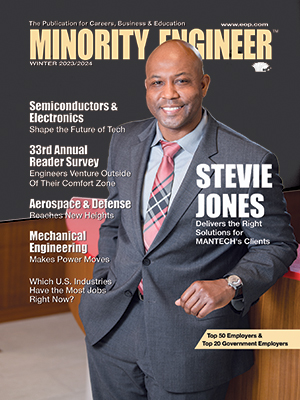| |

Minority Engineer Magazine, launched in 1979, is a career- guidance and recruitment magazine offered at no charge to qualified engineering or computer-science students and professionals who are African-American, Hispanic, Native American, and Asian American. Minority Engineer presents career strategies for readers to assimilate into a diversified job marketplace.
This magazine reaches minority engineers nationwide at their home addresses, colleges and universities, and chapters of student and professional organizations.
If you are an engineering student or professional who is a member of a minority group, Minority Engineer is available to you FREE!

|
|
 Minority Engineer
Minority Engineer
» Featured Articles
» Subscription Information
» Reader Survey
» Companies Actively Recruiting

VIRGINIA TECH PROFESSOR RECEIVES AWARD TO ADVANCE ARTIFICIAL INTELLIGENCE
Devi Parikh, an assistant professor in the Bradley Department of Electrical and Computer Engineering at Virginia Tech, received an Allen Distinguished Investigator Award for close to $1 million from the Paul G. Allen Family Foundation to teach machines to use “common sense” in image analysis.
Parikh uses cartoon scenes crafted from clip art to help computers read complex images. Humans interpreting visual scenes can take advantage of basic knowledge about how objects typically interact, but computers, Parikh notes, don’t have the same skill.
“The visual world around us is bound by common sense laws depicting birds flying and balls moving once they’ve been kicked, but much of this knowledge is hidden from the eyes of a computer,” she says. Computers, in other words, might have a lot of information about avian wing structure, but they don’t necessarily know that birds fly.
“Simply labeling images with this information does not address the underlying problem of how it all fits together,” says Parikh. “We need a dense sampling of the visual world to understand how subtle changes in the scene can change its overall meaning.”
Parikh proposes to use crowd sourcing, leveraging hundreds of thousands of Amazon Mechanical Turk workers (or “Turkers”) online, to illustrate the visual world using clip art.
The Turkers will use clip art to create scenes with visual features and basic written depictions of what’s happening. By learning to associate certain visual elements with the information in the text, the computer may eventually accumulate a lexicon of common sense that will help it understand the visual world like humans do.
”These clip art scenes will serve as a completely new and rich test bed for computer vision researchers interested in solving high-level AI problems,” says Parikh, who will be collaborating with Larry Zitnick and Margaret Mitchell at Microsoft Research. Zitnick is in the Interactive Visual Media group and Mitchell specializes in Natural Language Processing.
“Learning common sense will make our machines more accurate, reasonable, and interpretable — all imperative towards integrating artificial intelligence into our lives and society at large,” says Parikh.
The award is part of the Allen Distinguished Investigators Program, which was established to advance ambitious, breakthrough research in key areas of science. Parikh is also a recipient of the Army Research Office Young In - vestigator Award, and of two Google Faculty Research Awards.
Parikh leads the Computer Vision Lab at Virginia Tech. She is also a member of the Discovery Analytics Center, which has operations on the Blacksburg campus and also at the Virginia Tech Research Center in Arlington. The center is housed in the Department of Computer Science within the College of Engineering. She is also a member of the Virginia Center for Autonomous Systems at Virginia Tech.
 » Feedback for the Editor
» Feedback for the Editor
» Request Article Copy
|
|